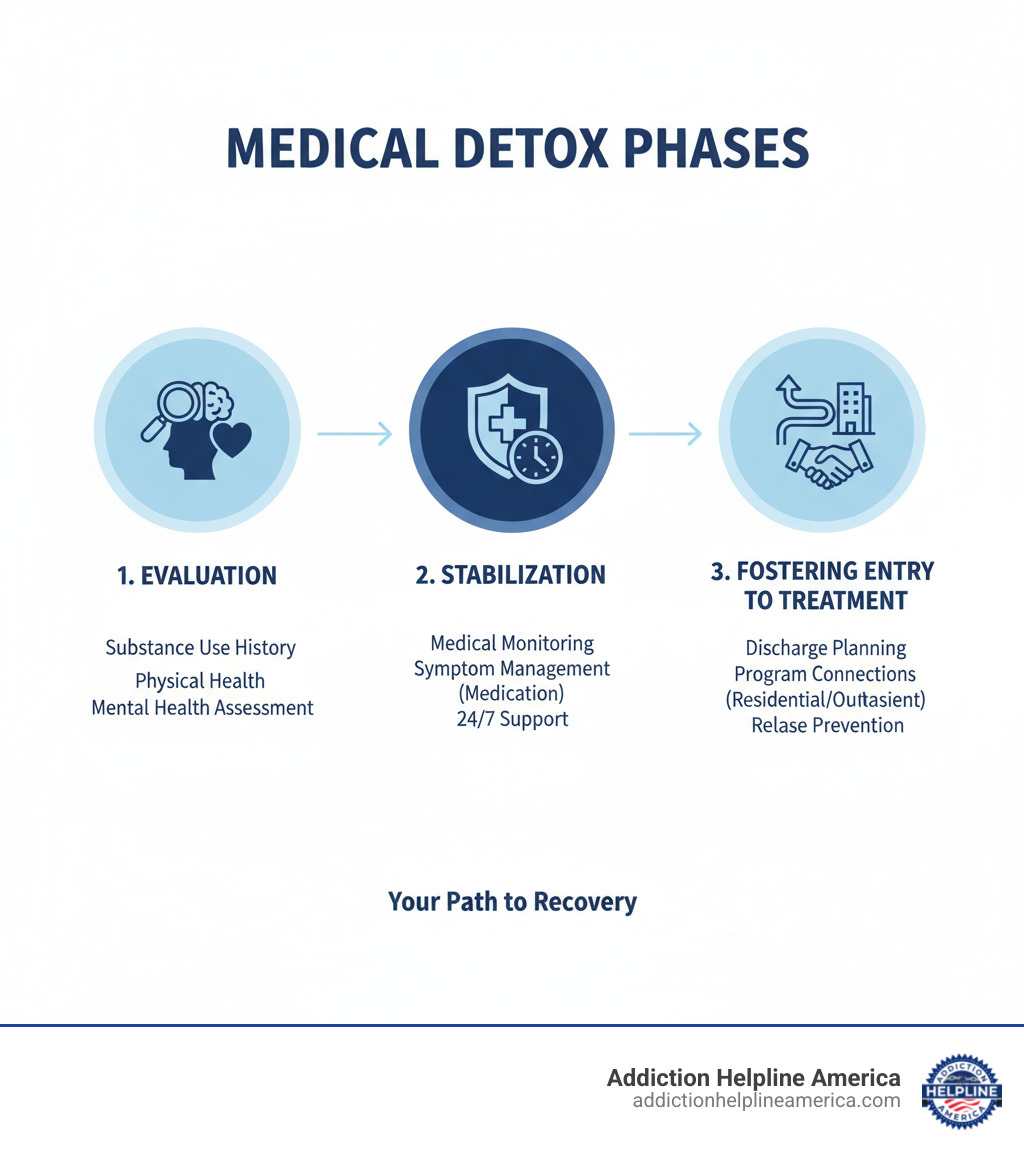
Why Finding the Right Opiate Detox Near You Matters
Searching for opiate detox near me is the critical first step toward breaking free from opioid dependence. If you need immediate help, here’s what to know:
Quick Answer: Finding Opiate Detox Near You
- Use trusted directories like FindTreatment.gov or call confidential helplines.
- Choose between inpatient (24/7 medical care) or outpatient (attend from home) programs.
- Verify the facility is licensed and offers medication-assisted treatment (MAT).
- Check your insurance coverage—most plans are required to cover detox.
- Ask about same-day admission for immediate help.
- Plan for what comes after, as detox alone is not a cure for addiction.
Opiate detox is the medically supervised process of safely withdrawing from opioids. While rarely life-threatening, withdrawal is extremely uncomfortable, and symptoms like severe pain, nausea, and intense cravings often lead to relapse. Medical detox in a professional facility makes the process safer and more tolerable with 24-hour monitoring and medications. This significantly increases the chances of continuing treatment and achieving long-term sobriety.
The stakes are high. Attempting to quit “cold turkey” at home often leads to relapse. After detox, your tolerance drops dramatically, and using the same amount as before can lead to a fatal overdose. This is why quality, medically supervised care is critical.
Choosing the right program matters. At Addiction Helpline America, we guide individuals and families through finding an opiate detox near me that matches their unique needs, connecting them with our nationwide network of trusted providers. We’re here to make the path forward as clear and accessible as possible.

Quick opiate detox near me terms:
Before You Search: Understanding Opiate Detox

Before searching for an opiate detox near me, understand that it’s the medically supervised process of managing withdrawal as your body clears opioids like heroin or fentanyl. Regular use creates physical dependence, where your brain needs the drug to feel normal, leading to tolerance and potentially opioid use disorder. You can learn more about Addictive Drugs.
Call Now – Your Journey to Recovery Begins Today!

Take the first step towards a healthier life! Call now to connect with our compassionate team and start your recovery journey today. Your path to healing awaits!
Our recovery specialists are available 24/7 to provide support, and all calls are confidential and free. Reach out anytime – we’re here to help!
Opiate Withdrawal Symptoms and Risks
Withdrawal is uncomfortable, with flu-like symptoms, severe muscle pain, nausea, anxiety, and powerful cravings. While not typically life-threatening, complications like dehydration can occur. The biggest risk is relapse. After detox, your tolerance is lower, and using your previous dose can cause a fatal overdose. This is why professional help is critical. Medical detox provides 24/7 monitoring and medications to manage symptoms, making the process safer and increasing your chances of success. Learn more about Drug Withdrawal Symptoms.
Signs You Need Opiate Detox
It’s time to seek help if you are:
- Taking opioids in larger amounts or for longer than intended.
- Experiencing withdrawal symptoms when you try to stop.
- Making unsuccessful attempts to quit.
- Neglecting responsibilities due to opioid use.
- Continuing use despite it causing problems in your life.
What Happens During Medical Detox?
The process typically involves three phases:
- Evaluation: A comprehensive assessment to create your personalized detox plan.
- Stabilization: 24/7 medical care and medication to manage withdrawal symptoms safely.
- Fostering Entry to Treatment: Planning your next steps, such as transitioning to a residential or outpatient program. Explore these Opiate Addiction Treatment Options.
Tip 1: Differentiate Between Detox Program Types
When searching for opiate detox near me, you’ll find two main types:
Inpatient detox offers 24/7 medical supervision in a residential facility. This structured, drug-free setting is ideal for those with severe dependence, co-occurring mental health disorders, or an unstable home environment. It provides the highest level of care and safety.
Outpatient detox allows you to live at home while attending scheduled appointments at a clinic. This is a more flexible and affordable option suitable for individuals with mild-to-moderate dependence and a strong, supportive home life.
Inpatient vs. Outpatient Opiate Detox
| Feature | Inpatient Detox | Outpatient Detox |
|---|---|---|
| Level of Care | High: 24/7 medical supervision, round-the-clock support | Lower: Scheduled visits to a facility, return home afterward |
| Environment | Structured, controlled, drug-free environment, removed from triggers | Home environment, requires strong support system and self-discipline |
| Ideal Candidate | Severe dependence, high risk of complicated withdrawal, co-occurring mental health disorders, unstable home environment | Mild to moderate dependence, stable home environment, strong social support, ability to manage responsibilities |
| Cost | Generally higher due to comprehensive care and accommodation | Generally lower, as it doesn’t include residential costs |
| Flexibility | Limited, as you reside at the facility | High, allows continuation of work, school, or family obligations |
A word of caution: Avoid programs promoting “rapid detox” under anesthesia. These unproven methods carry serious risks and are not recommended by leading medical authorities. Addiction Helpline America connects you only with reputable, evidence-based programs.
Tip 2: Evaluate a Center’s Quality, Staff, and Approach

The quality of a center is crucial for a successful detox. Here’s what to look for when evaluating an opiate detox near me.
Licensing and Staff
Ensure the facility is licensed by the state and, ideally, accredited by The Joint Commission or CARF. This indicates high standards of care. The staff should be a multidisciplinary team of physicians, nurses, and therapists who create an individualized treatment plan for you.
Key Questions to Ask When Choosing an opiate detox near me
- What is the staff-to-patient ratio? A lower ratio means more personal attention.
- Do you treat co-occurring disorders? If you have mental health issues, you need integrated dual diagnosis treatment.
- What is your aftercare planning process? Detox is the first step; the center should help you plan for continued care.
- What are the amenities and location? A comfortable environment can aid recovery. Decide if staying close to home or traveling is better for you.
Tip 3: Use Trusted Resources to Find an Opiate Detox Near Me
When you’re ready to find an opiate detox near me, start with trusted, confidential resources. The Substance Abuse and Mental Health Services Administration (SAMHSA) offers a National Helpline at 1-800-662-HELP (4357) and an online treatment locator at FindTreatment.gov. These free services can help you find licensed facilities. For immediate crisis support, you can call or text the 988 Suicide & Crisis Lifeline. All reputable resources, including treatment centers, are legally required to protect your privacy.
How Addiction Helpline America Can Help You Find a Program That Fits Your Needs
At Addiction Helpline America, we provide free, confidential, and personalized guidance to help you find the right recovery program from our vast network of treatment centers. Our experienced admissions navigators do the heavy lifting for you. We take the time to understand your unique needs, verify your insurance, and connect you with a program that fits your life. Operating nationwide, we don’t just give you a list of numbers; we act as your personal advocate to steer the treatment system. Think of us as your guide to a clearer, less frightening path to recovery.
Tip 4: Clarify Costs, Insurance, and Admission
Practical concerns like cost and admission are important when choosing an opiate detox near me.
Insurance and Payment Options
The Affordable Care Act (ACA) mandates that most insurance plans cover addiction treatment. In-network facilities are typically the most cost-effective. If you don’t have insurance, many centers offer private pay options, such as sliding scale fees or payment plans. Our team can help you verify your insurance and understand your options.
Same-Day Admission
For those in crisis, same-day admission can be a lifesaver, providing immediate care and preventing a potential overdose. Many facilities offer this, but it’s best to call ahead. We can help connect you with a center that has immediate availability.
Understanding the Cost of an opiate detox near me
Costs vary based on:
- Level of care: Inpatient is more expensive than outpatient.
- Program duration: A typical 5-7 day stay can be extended if needed.
- Location and amenities: Facilities in major cities or with luxury features cost more.
Tip 5: Inquire About the Detox Timeline and Medications

Understanding the timeline and medical support can ease anxiety about finding an opiate detox near me.
Detox Duration
The average opiate detox lasts five to seven days, but this varies. Withdrawal from short-acting opioids (heroin) peaks in 72 hours, while withdrawal from long-acting opioids (methadone) can last for weeks. Your use history and overall health also affect the timeline.
Medications for Opioid Use Disorder (MOUD)
Medication-Assisted Treatment (MAT) is the gold standard for making detox safer and more comfortable. These FDA-approved medications are not “replacing one drug for another” but are medical tools to reduce cravings and symptoms. Learn more about Opiate Addiction Treatment Options. Key medications include:
- Buprenorphine (Suboxone): Reduces withdrawal and cravings without a strong high.
- Methadone: Eliminates withdrawal symptoms and is dispensed in regulated clinics.
- Naltrexone (Vivitrol): Blocks opioid effects to prevent relapse after detox is complete.
Comfort medications for nausea, pain, and insomnia are also used to make the process more manageable.
Call Now – Your Journey to Recovery Begins Today!

Take the first step towards a healthier life! Call now to connect with our compassionate team and start your recovery journey today. Your path to healing awaits!
Our recovery specialists are available 24/7 to provide support, and all calls are confidential and free. Reach out anytime – we’re here to help!
Tip 6: Plan for the Crucial Next Steps After Detox
Detox is a critical first step, but it is not a cure for addiction. It addresses the physical dependence, but the psychological work is just beginning.
Importance of Continued Treatment
To achieve lasting sobriety, you must address the root causes of addiction. Continued treatment after detox is essential for developing coping skills and preventing relapse. Studies show that a comprehensive aftercare plan significantly increases the chances of long-term success. Learn more in our guide: Drug Rehab: What Is Rehab Aftercare?.
Types of Continuing Care
After detox, you can transition to:
- Residential Programs: Immersive, live-in treatment.
- Outpatient Programs (PHP/IOP): Flexible therapy sessions while living at home.
- Sober Living Homes: Supportive, drug-free housing.
- Support Groups: Peer support from groups like Narcotics Anonymous (NA).
Addiction Helpline America helps you find facilities that offer a clear path from detox to ongoing care.
Call Now – Your Journey to Recovery Begins Today!

Take the first step towards a healthier life! Call now to connect with our compassionate team and start your recovery journey today. Your path to healing awaits!
Our recovery specialists are available 24/7 to provide support, and all calls are confidential and free. Reach out anytime – we’re here to help!
Tip 7: Focus on the Long-Term Benefits of Recovery
Choosing to find an opiate detox near me is the first step toward a new life. The long-term benefits of recovery are profound and transform every aspect of your well-being. Committing to treatment allows you to achieve:
- Improved Physical and Mental Health: Heal your body and mind, gain clarity, and manage co-occurring disorders like anxiety or depression.
- Rebuilt Relationships: Mend broken trust and foster healthy connections with loved ones.
- Career and Financial Stability: Regain focus to pursue your goals and achieve financial independence.
- Refinded Passions: Find joy in hobbies and interests outside of substance use.
- Sustained Sobriety: Experience the freedom of a life no longer controlled by opioids.
Understanding Why People Become Addicted to Drugs can provide helpful context for your journey. The destination is worth every step.
Frequently Asked Questions about Opiate Detox
Is opiate withdrawal life-threatening?
Unlike withdrawal from alcohol or benzodiazepines, opiate withdrawal is rarely fatal on its own. However, it is extremely uncomfortable and can lead to complications like severe dehydration. The biggest danger is the high risk of fatal overdose if a person relapses after their tolerance has dropped. For these reasons, medically supervised detox is the safest option.
How long does opiate withdrawal last?
This varies. For short-acting opiates (e.g., heroin), acute withdrawal typically lasts about a week, peaking around 72 hours. For long-acting opiates (e.g., methadone), it can last for several weeks. Some people also experience Post-Acute Withdrawal Syndrome (PAWS), with psychological symptoms like anxiety or depression lasting for months. This highlights the need for long-term support.
Can I detox from opiates at home?
Detoxing at home, or going “cold turkey,” is not recommended. The severe discomfort leads to a very high risk of relapse. Because your tolerance drops quickly during detox, relapsing with your previous dose can easily lead to a fatal overdose. Medical detox is significantly safer and more successful, as it provides medications to manage symptoms and 24/7 supervision to prevent complications and support you through the process.
Your Path to Recovery Starts Today
If you’re searching for an opiate detox near me, you’re choosing hope and a healthier future. We’ve covered the key steps: understanding detox, choosing a program type, evaluating quality, using trusted resources, clarifying costs, and planning for long-term recovery. The benefits—restored health, mended relationships, and freedom from addiction—are within reach.
Finding help is possible, and it starts with a single phone call. At Addiction Helpline America, our team provides free, confidential, and personalized guidance. We’ll help you explore options from our trusted nationwide network, verify your insurance, and connect you with a program that fits your needs.
You don’t have to do this alone. We’ve helped thousands find their path to recovery, and we’re here for you. Recovery is about reclaiming your life. Your path can start today.
Find the right alcohol or drug addiction treatment program for you.
Our helpline is 100%
free & confidential
If you or someone you care about is struggling with drug or alcohol addiction, we can help you explore your recovery options. Don’t face this challenge alone—seek support from us.
Programs
Resources
Will my insurance
cover addiction
treatment?
We're ready to help
Find the best
drug or alcohol treatment
center
Are you or a loved one struggling with addiction? Call today to speak to a treatment expert.






